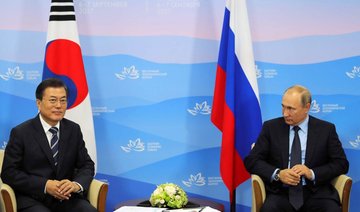WASHINGTON: Sanctions on North Korea have been tried, and failed. Serious negotiations seem like a pipedream. And any military strike would almost surely bring mass devastation and horrific civilian casualties.
The Trump administration’s options are going from bad to worse as Kim Jong Un’s military marches ever closer to being able to strike the US mainland with nuclear weapons. Just as President Donald Trump seeks to show global resolve after the North’s most powerful nuclear test, his leverage is limited even further by new tensions he’s stoked with South Korea, plus continued opposition from China and Russia.
With South Korea, the country most directly threatened, Trump has taken the unusual step of highlighting disagreements between the US and its treaty ally, including by floating the possibility he could pull out of a trade deal with South Korea to protest trade imbalances. He also suggested on Twitter the two countries lacked unanimity on North Korea, faulting new South Korean President Moon Jae-in, who has been more conciliatory to the North, for his government’s “talk of appeasement.”
It’s an inopportune time for grievances to be aired, and on Monday the two leaders sought to show they were confronting North Korea together — and with might. The White House said that in a phone call with Moon, Trump gave approval “in principle” to lifting restrictions on South Korean missile payloads and to approving “many billions” in weapons sales to South Korea.
In an early morning tweet Tuesday, Trump said, “I am allowing Japan & South Korea to buy a substantially increased amount of highly sophisticated military equipment from the United States.” Though no details were released, the idea was to show the countries were collaborating to bolster defenses against Kim’s government.
“He is begging for war,” US Ambassador to the UN Nikki Haley said of the North Korean leader Monday at the UN Security Council, where diplomats were called into emergency session despite the Labor Day holiday in the US
Haley called for exhausting “all diplomatic means to end this crisis.” But to those who tried and failed over a decade-plus to resolve it, there appear to be few such means that haven’t already been tried — and tried again.
What has changed is the sense of urgency, and the growing view among national security analysts that it may be time to abandon “denuclearization” and accept North Korea into the nuclear club. The North claimed Sunday’s test, its sixth since 2006, was a hydrogen bomb designed to be mounted on its new intercontinental ballistic missiles.
Short of allowing Pyongyang’s weapons programs to advance, Trump’s options all appear to be variations on what’s been considered before:
The military option
The US military for years has had a full range of contingency plans prepared for potential strikes on the North to try to disrupt its nuclear program or dissuade it from developing further. On Sunday, Trump dispatched Defense Secretary Jim Mattis to warn of a “massive military response” if the North keeps threatening the US, while Trump hinted in a call with Japan’s leader that the US could even deploy its own nuclear arsenal.
But over the years, the military options have consistently been viewed as unworkable, owing to the sheer horror that would ensue if North Korea retaliated — as would be expected — by striking South Korea. The North Koreans have massive military assets stockpiled on what is the world’s most heavily fortified border.
The US has roughly 28,000 troops in South Korea, and there are hundreds of thousands more American citizens just in Seoul, the capital, with a metro area population of 25 million. Gen. Joseph Dunford, chairman of the Joint Chiefs of Staff, has said if war broke out, there would be heavy civilian casualties in the first few days before the US could mitigate the North’s ability to strike Seoul.
Trade shutdown
Trump on Saturday declared on Twitter that the US was considering “stopping all trade with any country doing business with North Korea.” That would be a dramatic escalation of the longstanding US strategy: increasing economic pressure on North Korea by restricting its access to funds needed for its weapons programs.
But many countries do business with North Korea — especially China, a top US trading partner and economic behemoth. Cutting off trade with China, not to mention the others, would devastate the US economy and be incredibly difficult to enforce. Countless American businesses would be shuttered or hard hit, eliminating jobs along with them.
Sanctions and isolation
A total trade shutdown aside, the US has worked for years to squeeze Pyongyang financially and encouraged others to do the same — especially China. In a diplomatic victory for the Trump administration, the UN last month approved sweeping new sanctions targeting roughly one-third of the North’s economy, with China’s support.
But the latest nuclear test and recent missile tests suggest Kim is undeterred by those sanctions. And there’s strong reluctance from countries including China and Russia, both permanent Security Council members, to do more sanctioning.
“Do we think more sanctions are going to work on North Korea? Not necessarily,” US Ambassador to the UN Nikki Haley said Tuesday. “But what does it do? It cuts off the revenue that allows them to build ballistic missiles.”
Advocates for more sanctions say there’s still room to up the pressure. Anthony Ruggiero, a sanctions expert at the Foundation for Defense of Democracies, said the next logical step is for the US to impose “secondary sanctions” targeting banks or businesses in China that do business with North Korea, a tactic the US used effectively to push Iran to the table over its nuclear program several years ago.
“The chance for sanctions to work is that playbook,” Ruggiero said.
Diplomatic talks
China, backed by Russia, has been urging an immediate return to talks, predicated on the US halting joint military exercises with South Korea and the North suspending its weapons development. But few in the US government have advocated direct talks with the North Koreans until their behavior significantly changes. In the past, talks with the North have failed to prevent it from advancing its weapons program for long, and the US has accused Pyongyang of cheating on an earlier agreement.
The Trump administration has left the door open to talks with the North, and has tried to coax Kim into abstaining from provocative tests long enough to justify a US return to the table. So far, that coaxing hasn’t worked.





























